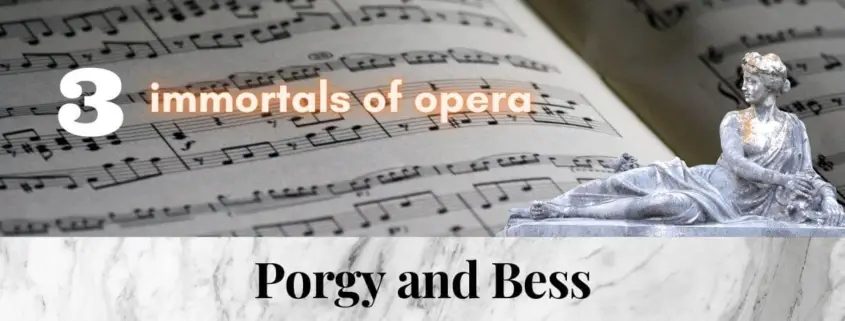3 immortal pieces from Gershwin’s PORGY AND BESS – the best interpretations in YouTube (Hits, Best of)
With “Porgy and Bess” Gershwin reached the peak of his skill. With this composition he succeeded in creating a work of world renown, one of the great folk operas in history. The performance of this opera is fraught with great difficulties, which is why the work is rarely heard. The power and authenticity of his music has prompted all the jazz greats of the last century to cover songs.
Summertime, the famous lullaby of Clara
Summertime is one of the most beautiful songs Gershwin ever composed. Gershwin knew he was going to have a hit with this song and he used it in several parts of “Porgy and Bess”. To ensure the authenticity of the music, Gershwin spent some time in the southern states, but he composed all the pieces for the opera himself and, according to his own statements, did not use any folk songs. Desto notwithstanding, “Summertime” is occasionally considered to be close to a spiritual called “Sometimes I Feel Like a Motherless Child”. Whether Gershwin knew the piece is not known, and so the relationship remains speculation.
A brief introduction by the strings leads into the soothing sounds of a clarinet and gentle notes of the glockenspiel in the swaying 2/2 time of a lullaby. The famous melody rings out, accompanied by jazzy harmonies from the orchestra. As the melody is repeated, a solo violin and a humming chorus of women enters. The chorus is scored in “piano” and takes over the orchestra’s harmonies, remaining in the background almost to the end. The solo violin is even notated “pianissimo” and thus only faintly audible. The orchestral colors become richer and richer, and soon the cor anglais, oboe and flute stand out from the orchestra.
Gershwin ends this piece with a beautiful final effect: while the voice holds the final B, the Summ choir goes aloft. The singing voice uses this sustained B with other effects such as octave leaps and glissandi. It is estimated that there are over 25,000 recordings of this piece, most of which are cover versions by jazz and pop greats.
Leontyne Price is probably the blueprint of opera interpretation. She was part of the cast of the 1952 World Tour, which generated the work’s worldwide breakthrough. The recording is from the later 1963 RCA recording.
Summertime – Price
Susanna’s poignant grief for her husband
This mourning passage is one of the highlights of the opera. Gershwin applied a motif with the sequence minor-major-minor chord, the technique of which has been “copied” many times since. The number ends with a magnificent expression of despair.
We hear this passage in a beautiful film version by Trevor Nunn with Cynthia Clarey. Last but not least, the ending is impressive (from 4:00).
My man’s gone now – Clarey
The lighthearted “I Got Plenty o’ Nuttin'”
Gershwin wrote this well-known song before he had the lyrics. He simply wanted to create a lighthearted moment. His brother Ira then had the brilliant idea for the title “I Got Plenty o’ Nuttin'” (as much as “I got enough nothing”).
The lightheartedness of the dispossessed beggar is created by a simple major melody and an accompaniment by the banjo. With the first repetition of the melody, Gershwin heightens the atmosphere, as he did in Summertime, by means of accompaniment by a Summ choir.
We hear the piece from Simon Rattle’s Glyndebourne production, sung by British-Jamaican baritone Willard White.
Oh, I got plenty o’nuttin – White







Leave a Reply
Want to join the discussion?Feel free to contribute!